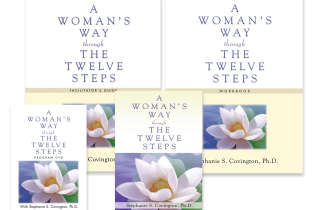
A Woman’s Way through The Twelve Steps
[Covington, S. Center City, MN: Hazelden Publishing]
All four components of A Woman's Way through The Twelve Steps are designed for use with women in residential and outpatient treatment programs, as well as mental health and criminal justice settings. The components can stand alone, but to achieve the best outcomes, it is recommended that all four components be used together as a comprehensive, integrated treatment program for women.
[Covington, S. (1994 English, 2010 Spanish). Center City, MN: Hazelden Publishing]
This compilation of a diverse group of real women’s voices and wisdom illuminates how women understand the Twelve Steps of Alcoholics Anonymous and offers inspiring stories of how they have traveled through the Steps and discovered what works for them. The book can be used alone or as a companion to The Twelve Steps and Twelve Traditions of Alcoholics Anonymous.
By drawing attention to how recovery raises special issues for women - from questions about sexuality and relationships to essential topics such as powerlessness, spirituality, and trauma - A Woman’s Way empowers women to take ownership of their recovery and to grow and flourish in sobriety.
Also available in Spanish.
[Covington, S. (2000 English, 2010 Spanish). Center City, MN: Hazelden Publishing]
A Woman’s Way through The Twelve Steps Workbook is designed to be used in conjunction with the book A Woman’s Way through The Twelve Steps. This workbook helps to increase understanding of the lessons in the book and brings them to life with simple exercises and journaling activities. It further empowers each woman to take ownership of her recovery by documenting her growth and recovery process in a personally meaningful way.
Workbook also available in Spanish.
[Covington, S. (2009). Center City, MN: Hazelden Publishing]
The facilitator's guide describes the most effective ways to conduct the program, which is a thirteen-session curriculum of experiential activities and discussions that focus on the themes in each of the Twelve Steps. It describes when and how to use the book, workbook, and DVD, as well as instructions on how to adapt the content for girls. The guide also offers essential background information and integrates the most current research and best practices regarding women and recovery to support a powerful program that is designed to help women recover from substance-use disorders and other addictive behaviors.
[Covington, S. (2009). Center City, MN: Hazelden Publishing]
A Woman's Way through The Twelve Steps DVD is for clients, family members, and facilitators who want to learn how women and girls can utilize the Twelve Steps in a safe, nurturing environment that allows them to heal from addiction. The DVD begins with an introduction to the A Woman's Way through The Twelve Steps program, followed by the author, Stephanie S. Covington, Ph.D., leading participants through discussions and exercises that address complex issues, such as shame, isolation, and abuse, and empower women. Facilitators of the A Woman's Way program will appreciate Chapter 2, "Special Feature: Tips for Facilitators," which includes a roundtable question-and-answer session between Covington and five facilitators.
For international shipments, please contact kim@stephaniecovington.com.
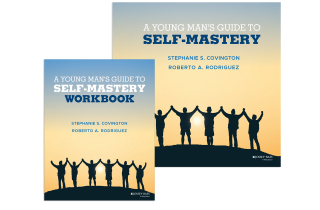
A Young Man's Guide to Self-Mastery
[COVINGTON, S. and RODRIGUEZ, R. (2021). HOBOKEN, NJ: WILEY]
This 14-session program addresses the unique needs of adolescent boys and young men between the ages of 12 and 18. Boys live in a world that is complicated as they attempt to navigate their psychological and physical development. The typical adolescent male is caught up in a maelstrom of hormonal, social, and cultural shifts that would be difficult to deal with even in ideal conditions. Chances of atypical or disordered development increase exponentially in the midst of troubling experiences. In fact, for many young men, typical male socialization can be characterized as a series of traumatic events. Boys who suffer adverse or troubling life events also experience significant impairment in neural development. This can lead to trouble in critical thinking, trouble in reconciling emotional events, and antisocial behavior.
This program focuses on the effects of adversity and trauma on the lives of young men and is designed to help them to mitigate some of those effects, such as abuse of alcohol and other drugs. The techniques incorporated in this curriculum are meant to create an atmosphere of safety and of mutual learning. Some of the topics included are: cyber-bullying, substance misuse, emotional development, process of trauma and what it means to be a man in today’s world.
To be placed on the list to be notified when this publication is available, please email kim@stephaniecovington.com.
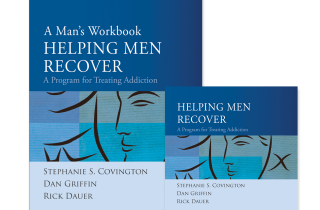
Helping Men Recover: A Program for Treating Addiction
[Covington, S., Griffin, R., and Dauer, R. (2011). Hoboken, NJ: Wiley]
Helping Men Recover is the first gender-responsive, trauma-informed treatment program for men. The materials are grounded in research, theory, and clinical practice and include a facilitator’s guide and a participant’s workbook. This is the men’s version of the widely used, evidence-based women’s curriculum, Helping Women Recover. This curriculum addresses what is often missing in prevailing treatment modes: a clear understanding of the impact of male socialization on the recovery process, a consideration of the relational needs of men, and a focus on the issues of abuse and trauma. The Helping Men Recover Facilitator’s Guide for the 18 session program is a step-by-step manual containing the theory, structure, and content needed for running groups. The participant’s workbook allows men to process and record the therapeutic experience. The program model is organized into four modules that emphasize the core areas of men’s recovery: self, relationships, sexuality, and spirituality. The materials are designed to be user-friendly and self-instructive. This allows the Helping Men Recover program to be implemented by a staff with a wide range of training and experience.
A Man's Workbook offers a companion product that is tied seamlessly to the Helping Men Recover Facilitator's Guide. This participant workbook has four modules (self, relationships, sexuality, and spirituality) and allows men to process and record the therapeutic experience. It contains exercises for use in group sessions, summaries of information presented from the facilitator's guide, and reflection questions and activities for use after group sessions.
For international shipments, please contact kim@stephaniecovington.com.
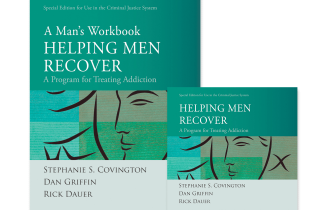
Helping Men Recover: A Program for Treating Addiction (Criminal Justice)
[Covington, S., Griffin, D., and Dauer, R. (2011). Hoboken, NJ: Wiley]
This version of Helping Men Recover addresses the special concerns and issues of men with substance-use disorders who are in correctional settings. The facilitator’s guide has specific information on men in the criminal justice system, as well as special tips on program facilitation in this venue. These materials are used in jails, prisons, drug courts, and community correctional settings.
For international shipments, please contact kim@stephaniecovington.com.
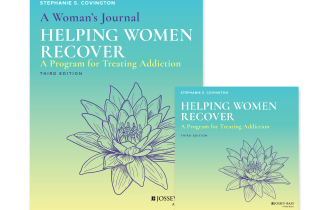
Helping Women Recover: A Program for Treating Addiction
[Covington, S. (1999, rev. 2008 and 2019). Hoboken, NJ: Wiley]
This revised edition of Dr. Covington’s innovative, evidence-based program integrates theories of women’s psychological development, trauma, and addiction to meet the needs of women with addictive disorders. The comprehensive, twenty-session curriculum contains four modules that address the areas that women in treatment identify as triggers for relapse: self, relationships, sexuality and spirituality. They include the issues of self-esteem, sexism, family of origin, relationships, domestic violence, and trauma. The user-friendly and self-instructive materials are a step-by-step facilitator’s guide and a participant’s journal, entitled A Woman’s Journal, that is filled with self-tests, checklists, and exercises to enable each participant to create a personalized guide to recovery.
Some of the new updates to the 3rd edition include:
Sales of the 2nd edition journals will continue until the publisher runs out of stock. You will need to use the same edition facilitator guide and journals, therefore you may not use the 2nd edition facilitator guide with 3rd edition journals.
For international shipments, please contact kim@stephaniecovington.com.
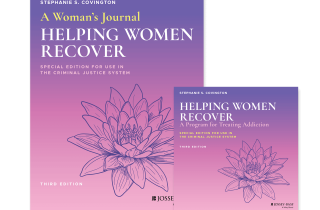
Helping Women Recover: A Program for Treating Addiction (Criminal Justice)
[Covington, S. (1999, rev. 2008 and 2019). Hoboken, NJ: Wiley]
In this revised version of Helping Women Recover, Dr. Covington addresses the special concerns and issues of women with substance use disorders who are in correctional settings. The facilitator’s guide has specific information on women in the criminal justice system, as well as special tips on program facilitation in this venue. These evidence-based materials are widely used in jails, prisons, drug courts, and community correctional settings.
Some of the new updates include:
For international shipments, please contact kim@stephaniecovington.com.
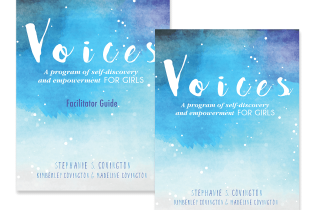
Voices: A Program of Self-Discovery and Empowerment for Girls: Second Edition
[Covington, S., Covington K. and Covington, M. (2004, rev. 2017). Carson City, NV: Change Companies]
Voices was created to address the unique needs of adolescent girls and young women. It encourages them to seek and celebrate their “true selves” by providing a safe space, encouragement, structure, and the support they need to embrace their journeys of self-discovery. The program includes modules on self, connecting with others, healthy living, and the journey ahead. Today we are hearing more about girls and bullying, the pressures of social media, early puberty, gender exploration, human sex trafficking, and binge drinking. Texting, social media, and online or “in real life” (IRL) friends are part of the changes in girls’ social lives. These are some of the topics added to the 2nd edition. It is used in many settings (e.g., outpatient and residential substance abuse treatment, schools, juvenile justice, and private practice).
Voices is based on the realities of girls’ lives and the principles of gender responsivity; it is also grounded in theory, research, and clinical experience. The Voices curriculum advocates a strength-based approach and uses a variety of therapeutic approaches, including psychoeducational, cognitive-behavioral, mindfulness, body-oriented, and expressive arts.
The facilitator’s guide includes background information about young women, gender-responsive principles, the theoretical foundation of the program, and trauma-sensitive yoga exercises. It provides information about running the eighteen group sessions that are the core of the program (the structure and content for each topic and activity), as well as a program overview and lists of materials needed for the sessions. The program materials also can be used to train staff members in working with girls.
The participant’s journal utilizes a research-based process called Interactive Journaling.® which is listed on SAMHSA’s National Registry of Evidence-based Programs and Practices (NREPP) website. The summary is available on the NREPP web site. In the context of girls’ lives, structured journaling provides an outlet for creativity, personal expression, exploration, and application of new concepts and skills.
For international shipments, please contact kim@stephaniecovington.com.
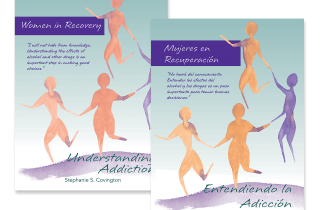
Women in Recovery: Understanding Addiction
[Covington, S. (2007). Carson City, NV: Change Companies]
This 48-page, interactive workbook is intended for use as an educational journal by women in substance abuse treatment programs. The material, which is presented in a colorful, easy-to-read format, is based on the most up-to-date information about the impact of substance-use disorders on women’s health, families, and relationships. It uses the research-based process of Interactive Journaling.®
For international shipments, please contact kim@stephaniecovington.com.
Please contact us with any questions about your book order, or for assitance with placing an order.